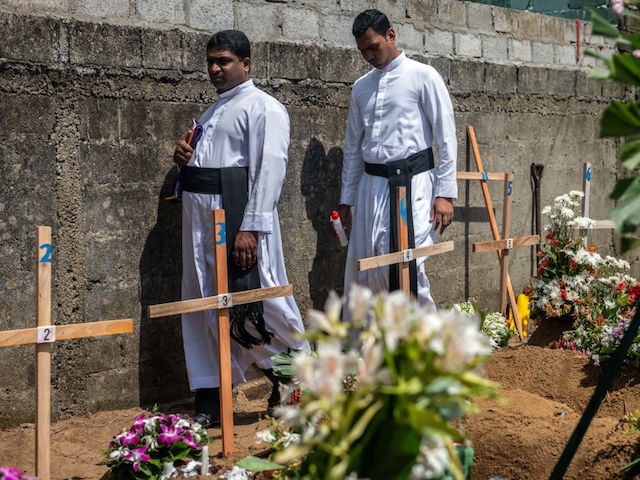The recent terrorist attacks at hotels and churches in Sri Lanka on Easter Sunday were a stark reminder terrorists don’t necessarily have to strike on our soil to harm us.
Indians, Britons, Australians, Portuguese, Americans, Chinese, and local Sri Lankans were among the hundreds of people killed and wounded by the suicide bombings. Even more, many of them were Christians attending Easter services — a fact that struck a chord with millions of their fellow believers who were also celebrating the holy day — or innocent bystanders who happened to be at the wrong place at the wrong time.
The world is now waking up to the reality that cultural and religious extremist groups such as ISIS might not be as weak as we thought they might be. In fact, they are proliferating across the Middle East and Asia, gaining strength as politicians appease extremists to win elections, stay in power, or, in some cases, protect their lives.
The world would be remiss if we forget the Sri Lanka attacks or ignore these three lessons we should have learned from them:
We need better cooperation between government agencies
Ever since the Sunday attacks, Sri Lanka’s response has been a tangled mess of confusing and conflicting narratives. Officials received multiple warnings days ahead — even just hours before — that an attack was imminent and yet failed to act or ring the alarm. Then, shortly after the attack, they said a local, little-known radical Islamic group was responsible for the attacks, but the next day ISIS released a video claiming their “fighters” were behind them and later published another video of their leader Abu Bakr al-Baghdadi praising the suicide bombers. It was the first time Baghdadi has made an appearance since the group overtook Mosul in 2014.
At times, the government’s response has been on the verge of the absurd: in the days following the attacks, the death toll rose steadily from an initial estimate of over 200 people to nearly 360. But come Friday, Sri Lanka’s director-general of health services said there was a calculation error: it was actually over 250, not 360, people who were killed by the bombings. In another example, Sri Lankan police in their frantic search for culprits mistakenly identified a Brown University student from Maryland as a suspect. The 22-year-old student woke up to a flood of Facebook comments accusing her of being a terrorist.
As prominent as Sri Lanka’s blunders are, similar intelligence failures have cropped up in other attacks. It is time intelligence agencies and public officials cooperate to make sure the people they are charged with protecting are safe. A place to start would be establishing a global list to track cultural and religious extremist groups and their funders, especially as they are now receiving support and weapons from overseas.
Religious groups must fight extremism from within their own communities
If Muslims in Sri Lanka who were aware people among them were becoming radicalized had raised sufficient concerns, there would have been a chance to prevent the bombings. According to reports, family members of some of the suspected suicide bombers saw them become more radical in their beliefs and isolate themselves from their community. Moreover, initial investigations revealed many of the suspects were well-educated people, some who studied abroad and came from middle or upper-class families. They did not fit the stereotypical picture of disaffected, jobless youths who found religion and became radicalized. In fact, it probably would have been more difficult for them to fall off the grid given they had strong social safety nets.
Of course, it’s not just any particular religious group that must remain vigilant, but any community — whether cultural, religious, ethnic, or even political — that has members who can become radical and violent must look out for these people and if possible help them. It is the job of every citizen, not just security agencies, to watch out for each other and to cooperate with authorities to prevent tragedies from happening.
We cannot effectively fight extremism if we do not identify its true targets
One of the first questions Sri Lankan officials puzzled over after the attacks was: why target churches? Sri Lanka’s long-running conflict has largely been between Sinhalese Buddhists and Tamil Hindus. For the most part, Muslims and Christians have lived in peace with each other and actually shared persecution at the hand of Sinhalese nationalists who see them as outsiders. As details emerged, and ISIS later claimed responsibility for the attack, it became clear this was an attack on Christians because of their faith. Officials believe the hotels were targeted because they were places frequented by Westerners, whom radical Islamists view as Christian, regardless of what they believe.
Yet, when news of the attacks broke in the West, several prominent leaders offered watered-down responses, referring to the victims as “Easter worshippers.” Had the attacks happened at mosques during Ramadan, I doubt they would have said “Ramadan worshippers.”
Such dithering responses hamper our ability to combat extremism because they blind us to the ideological struggle behind the violence. For ISIS, an attack on Christians is an attack on the West, whom they see as Islam’s greatest enemy.
I am heartened many Middle East Muslim leaders – such as President Abdel Fattah el-Sisi of Egypt, King Abdullah II of Jordan, and Abu Dhabi Crown Prince Mohamed bin Zayed, among others – publicly condemned the Easter massacre. But Christians in the West must show a higher level of solidarity when their fellow religionists are attacked.
Most Rev. Joseph D’Souza is an internationally renowned human and civil rights activist. He is the founder of Dignity Freedom Network, an organization that advocates for and delivers humanitarian aid to the marginalized and outcastes of South Asia. He is archbishop of the Anglican Good Shepherd Church of India and serves as the president of the All India Christian Council.

COMMENTS
Please let us know if you're having issues with commenting.